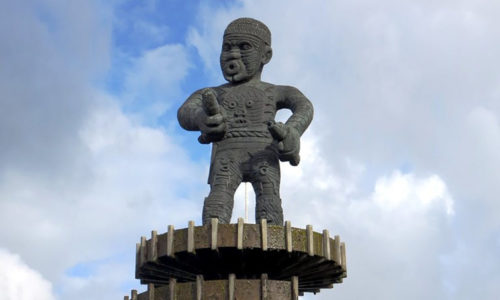Reckoning With Slavery Requires Access to Records of the Past
Share
Explore Our Galleries
Breaking News!
Today's news and culture by Black and other reporters in the Black and mainstream media.
Ways to Support ABHM?
What a revolt’s archives tell us about who owns history.
By Marjoleine Kars, yesmagazine.org
The consequences of 400 years of the Atlantic slave trade are still felt today. Untangling the power structures and systemic racism that came with slavery is ongoing, with police brutality, memorials to slave owners, and reparations forming part of the discussion.
But as the United Nations marks Dec. 2 as the International Day for the Abolition of Slavery, a practice it notes “is not a merely a historic relic,” modern society also has to reckon with another question: Who has access to the records about slavery’s past?
I was struck by this question recently as I gave a Zoom talk in Guyana on my new book Blood on the River: A Chronicle of Mutiny and Freedom on the Wild Coast about a slave rebellion in Berbice, now Guyana, that took place in 1763-1764.

Statue of the Berbice slave revolt leader Kofi in Georgetown, Guyana.
Photo by David Stanley/Wikimedia. CC BY-SA
During the revolt, [those who were formerly enslaved] organized a government and controlled most of the colony for almost a year. The Dutch either fled altogether or holed up on a well-fortified sugar plantation near the coast. A regiment of European soldiers sent from neighboring Suriname mutinied and joined the rebels they had come to defeat. But obligated by treaties, Indigenous peoples such as Carib and Arawak fought on the side of the Dutch. The revolt ended when the rebels, out of food and arms, were overpowered by enemies who had received an infusion of men and supplies from the Dutch Republic.
Berbice became British Guyana in the early 19th century and gained independence as the English-speaking Cooperative Republic of Guyana in 1966. Modern-day Guyanese view the slave rebellion as the origin of their republican inclinations.
Yet, all of the records related to the rebellion—in fact, most of the country’s historical records—are in archives in London and The Hague.
The sources for the uprising are extensive. There are the usual colonial records, such as the colonial governor’s daily journal, letters from officials and merchants, and military reports. They are tainted by self-interest, Eurocentrism, and racism.
Read the full article here.
Learn more about the Black experience from before slavery to now here.
More Breaking News here











Comments Are Welcome
Note: We moderate submissions in order to create a space for meaningful dialogue, a space where museum visitors – adults and youth –– can exchange informed, thoughtful, and relevant comments that add value to our exhibits.
Racial slurs, personal attacks, obscenity, profanity, and SHOUTING do not meet the above standard. Such comments are posted in the exhibit Hateful Speech. Commercial promotions, impersonations, and incoherent comments likewise fail to meet our goals, so will not be posted. Submissions longer than 120 words will be shortened.
See our full Comments Policy here.